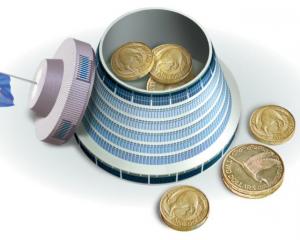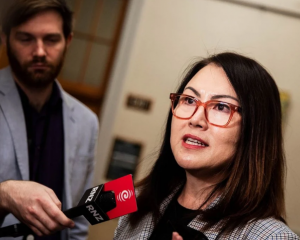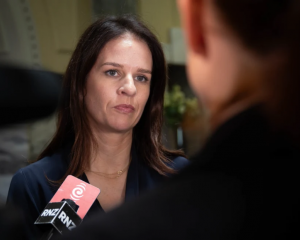
He says Australian taxpayers will also be forking out on the deal for decades, when the country could have got more non-nuclear submarines, faster - and for a fraction of the price.
Carr, along with former Labour prime minister Helen Clark, and former Tuvalu prime minister Enele Sopoaga was speaking at Parliament on Thursday morning, in a Labour Party-hosted discussion about the defence partnership between Australia, the United Kingdom and United States (AUKUS).
The initial agreement focused largely on the provision of nuclear submarines to Australia, precluding New Zealand - with its long-held anti-nuclear policy - from joining.
However, the New Zealand government is exploring the possibility of signing up to the second pillar, focused on cutting-edge defence technology - covering areas like artificial intelligence, hypersonic missiles and cyber warfare, with Foreign Minister Winston Peters saying talks are focused on gathering the facts before making a decision.
The previous Labour government had also spoken about the possibility of joining Pillar 2, but Labour leader Chris Hipkins - introducing the session - told attendees that signals from the coalition suggested New Zealand's independent and largely bipartisan approach to foreign policy "is now changing".
"Having spent the last election campaign saying that they agreed with everything the last Labour government was doing when it came to foreign policy, they now seem to be diverging from that path and AUKUS stands out as a clear example," he said.
The government appeared, he said, to be "rushing headlong" into the Pillar 2 of the agreement without having articulated what it was.
Carr, who was foreign minister in the Julia Gillard government, took a dim view of the deal.
"It's pure bull****," he said. "Pillar 2 is fragrant, methane-wrapped bull**** ... Why do I call it bull****? Because it's been cobbled together to make it look like there's more to AUKUS than subs - there isn't."
Countries like Australia and New Zealand would not be able to produce the kinds of advanced technologies Pillar 2 promised, he said, and the deal was based on ensuring the US became their sole supplier of it.
He said the first part of the deal would also leave Australia less well defended with, possibly, no submarines of its own to replace the ageing ones it has now - all for the cost of $368 billion, far more than the cost of the deal of the French submarine deal Australia previously signed up to.
The Australian-built submarines AUKUS promised would not be available until the 2050s, he said.
"Scott Morrison - whose judgement on nothing would be trusted ... who seceretly without telling his Cabinet or any individual minister had himself sworn in to a dozen portfolios ... settled on AUKUS as a way of dividing the Labor Party, and seeing Labor isolated into the lead-up to an election he was most likely to lose," Carr said.
"For a fraction of that price we could have given ourselves 10, 15, 20, even 40 conventional subs that would have rendered Australia - as far as submarine technology goes as safe as we've ever been."
Thirdly, he advocated for a different approach which did not assume war between the US and China was inevitable, but instead would define the relationship as adversarial - warning against the risks of nuclear warfare.
Clark had earlier said it was the government's job to navigate relationships with both China and the US, "and not act in ways which support polarisation and support a view that one side is driving tensions".
She said the previous Labour government had missed an opportunity to rule out any involvement in AUKUS, before she laid out her argument that New Zealand was now taking a "different course", aligning itself with the United States.
She highlighted support for the bombing on Yemen after disruption of trade in the Red Sea, the naming of China as the source of hacking New Zealand Parliamentary systems, and finally Peters and US Secretary of State last week announcing the two countries had "powerful reasons" for New Zealand to engage with AUKUS.
"And then the prime minister was quoted in The Australian as saying AUKUS is very good for our reason - well, again, not any specific reason for that given - and prior to all this there was the joint ministerial meeting in Canberra which went down a very similar track, and even invoked ANZUS as a living engagement."
She said claims AUKUS would be good for New Zealand were "highly contestible" and questioned the value of ratcheting up tensions with China, a major trading partner.
Sopoaga said the nuclear submarines were essentially nuclear power plants on boats, with no guarantee they would not carry nuclear weapons, and which would be "cruising through the waters of the pacific island nations without any consultation whatsoever with the pacific countries.
"This is not our agreement, it is theirs - the AUKUS deal was crafted in secret by former Prime Minister Scott Morrison, with no public discussion as I understand it ... no mention in the media, nor in the the Parliament of Australia, nor in Cabinet."
He and Carr both said the Albanese government in Australia should have reviewed the agreement and whether it was needed.
The relationships between Pacific Islands and Australia and New Zealand were becoming more strained, he said, because of Australia's climate policy and continued sale of coal to China - and pointed to destabilising effect on security posed by the submarine deal.











